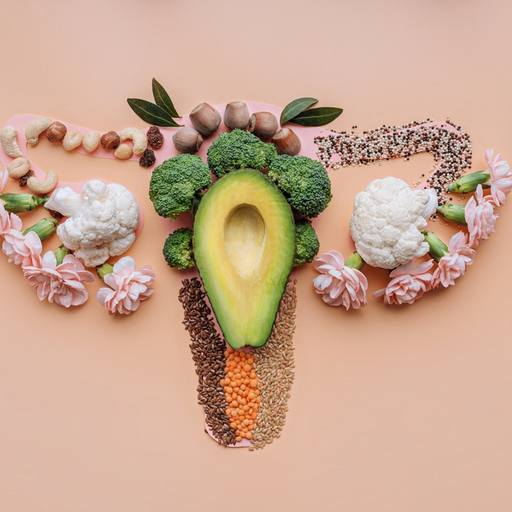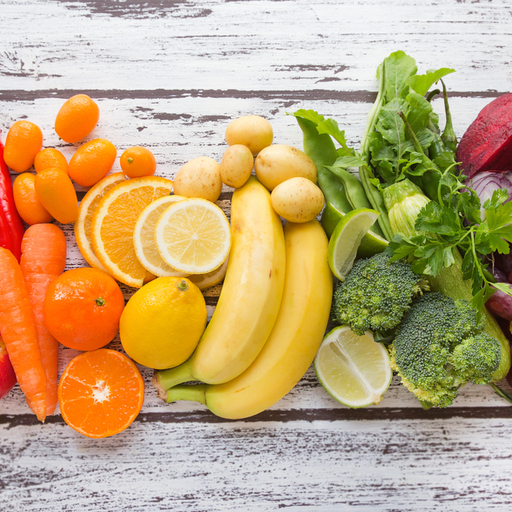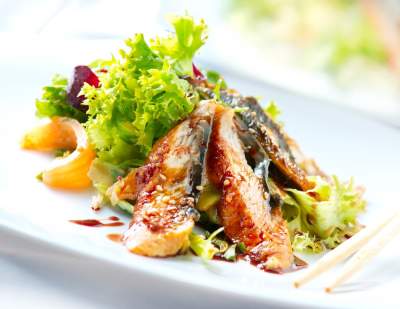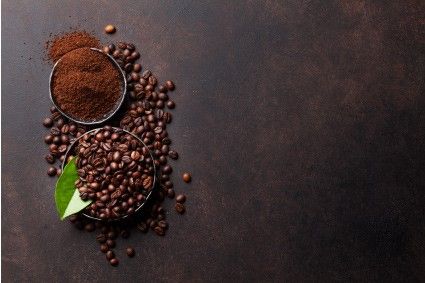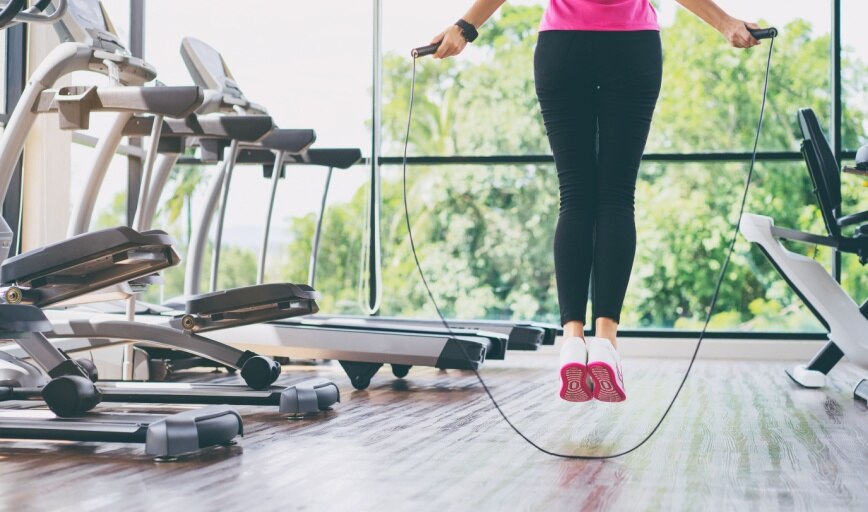

Surfing the crimson wave during that time of the month, periods can be an uncomfortable experience for some women. Mood swings, abdominal cramps, headaches, body pain, acne, dizziness, nausea, water retention, bloating, fatigue, depression, anxiety, stress – you name it; these symptoms continue to trouble women.
What you should know:
- 5 foods you should eat during your period
- 5 foods you should avoid during your period
- Nutrients essential during periods
5 foods you should eat during your period
Who knew that adding the right food and removing others could make a world of difference? Your diet can have a direct impact on your hormonal changes, which can aggravate some of the aforementioned symptoms. Make the following dietary changes to reduce period symptoms:
- Leafy green vegetables: When blood is lost every month during menstruation, iron is also lost with the red blood cells. If the blood flow is too heavy and iron is not replenished in your cycle, then iron deficiency can lead to anemia. To avoid this, include leafy green vegetables in your meals, such as kale, collard and spinach, which is a powerhouse of magnesium, vitamin B6, and vitamin E, further helping you fight menstrual cramps.
- Dark chocolate: You never need a reason to chomp away on a bar of chocolate. Dark chocolate is a great source of iron and magnesium, which helps in reducing the severity of premenstrual syndromes (PMS).
- Nuts: Nuts are rich in omega-3 fatty acids and are loaded with protein. Nuts keep you feeling fuller for a long period of time and sustain your energy levels. They also contain magnesium and other vitamins. You can either have plain nuts or include them in your salads or smoothies.
- Turmeric: Turmeric is a great anti-inflammatory spice that can reduce bloating. Curcumin is its active ingredient, which, apart from its many medicinal benefits, can also soothe premenstrual syndromes.
- Fruits: Consume fresh watery fruits to stay hydrated. Eating sweet fruits can help you refrain from eating refined sugar. Therefore, your blood sugar level stays normal and does not spike.
Hydrate plenty. Drink a lot of water, especially during your periods, to prevent dehydration headaches, a common symptom of menstruation, and to reduce the chance of your body retaining water.
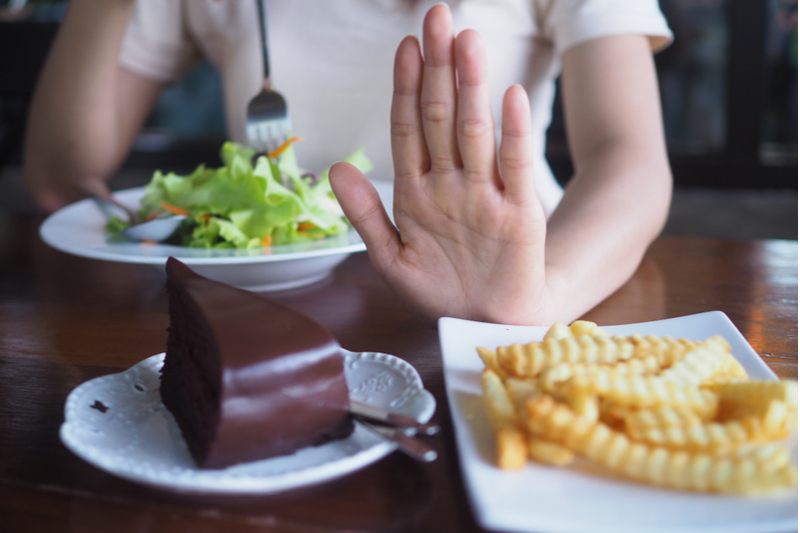

5 foods you should avoid during your period
- Spicy foods: Spicy foods can cause stomach pains and diarrhea. Fight your cravings. Avoid spicy and salty foods during your menstrual cycle, as they lead to water retention and bloating.
- Sugar: Watch your sugar intake. Have sugar in moderation, as a spike in energy can worsen your mood swings.
- Red meat: During periods, your body produces prostaglandins. These compounds help your uterus contract and shed the uterus lining, resulting in your menstrual flow. High levels of this compound available in red meat can cause cramps.
- Refined grains and processed foods: Steer clear of having pasta, noodles, or bread as they interrupt your blood sugar and appetite control. Processed foods like chips or biscuits contain sodium. So, it is best to avoid salt.
- Alcohol: Avoid consuming alcohol as it causes digestive issues, headaches, nausea, diarrhea, and dehydration.
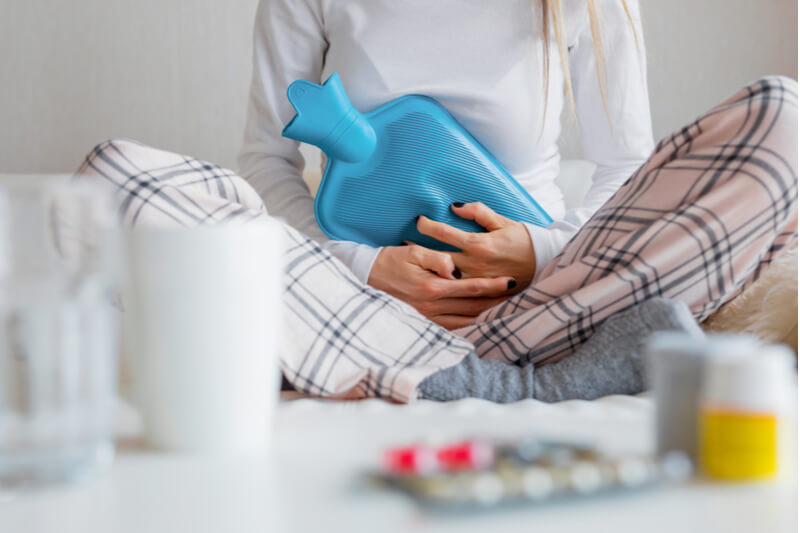

Nutrients essential during periods
It is suggested that diets rich in calcium, vitamin D, and omega-3 fatty acids, like fish and foods low in animal fat, caffeine, and salt, may reduce the risk of painful periods. During periods, several essential nutrients can help support your overall health.
- Iron is crucial for hemoglobin formation in the blood, which helps transport oxygen throughout the body. Some good sources of iron include spinach, beans, lentils, fish, meat, poultry, and fortified cereals.
- Calcium can keep bones and teeth strong and prevents the risk of osteoporosis later in life. Calcium can be found in milk products, leafy vegetables, fortified cereals, and orange juice.
- Vitamin D aids in calcium absorption and is vital for your bone health. Exposure to sunlight, fatty fish, fortified dairy products, and cereals are powerhouses of vitamin D.
- Vitamins B6 and B12 help maintain energy levels and reduce fatigue during periods. Eggs, poultry, fish, meat, dairy products, whole grains, and fortified cereals – all these foods contain these nutrients.
- Magnesium maintains muscle and nerve function and regulates blood sugar and blood pressure levels. Magnesium can be found in nuts, seeds, leafy green vegetables, and whole grains.
Try light cardio, yoga, or exercises for period pain relief. Hot compresses and massages can help a great deal in soothing body pain.
Stay tuned to the Activ Living Community. Keep up to date with the latest health tips and trends through expert videos, podcasts, articles, and much more in nutrition, fitness, mindfulness, and lifestyle conditions like Asthma, Blood Pressure, Cholesterol, and Diabetes.
Popular Searches
Natural Beta blockers | How to cure depression | Summer activities for kids | High bp symptoms | HIIT workout | How to increase platelet count | Dash diet | Systolic and diastolic blood pressure | High blood sugar symptoms | Tabata workout | Push ups for beginners | Benefits of zumba | How to prevent breast cancer | Homeopathic medicine for asthma | Fruits to avoid in pcos | Neck pain relief exercises |Yoga for heart | Healthy soup recipes | Anti aging foods | Vitamin rich foods












